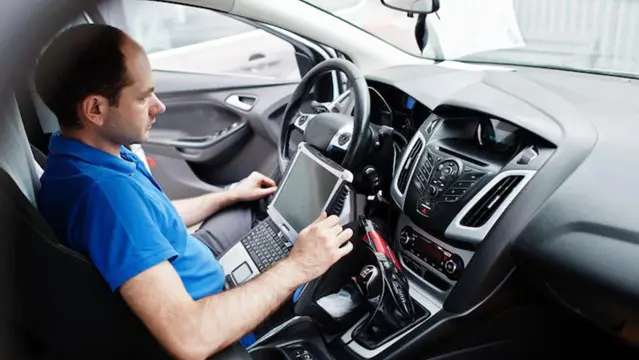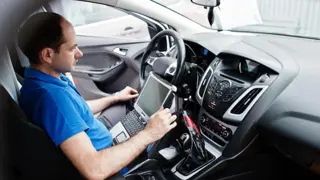
Automotive Electrics and Automotive Electronics
Self-paced videos, Lifetime access, Study material, Certification prep, Technical support, Course Completion Certificate
Uplatz
Summary
- Reed courses certificate of completion - Free
- Uplatz Certificate of Completion - Free
Add to basket or enquire
Overview
Uplatz offers comprehensive training on Automotive Electrics and Automotive Electronics. This is a video-based online course (self-paced training). You will be awarded Course Completion Certificate at the end of the course.
Automotive electronics are electronic systems used in vehicles, including engine management, ignition, radio, carputers, telematics, in-car entertainment systems, and others. Ignition, engine and transmission electronics are also found in trucks, motorcycles, off-road vehicles, and other internal combustion powered machinery such as forklifts, tractors and excavators. Related elements for control of relevant electrical systems are also found on hybrid vehicles and electric cars.
Electronic systems have become an increasingly large component of the cost of an automobile, from only around 1% of its value in 1950 to around 30% in 2010. Modern electric cars rely on power electronics for the main propulsion motor control, as well as managing the battery system. Future autonomous cars will rely on powerful computer systems, an array of sensors, networking, and satellite navigation, all of which will require electronics.
Certificates
Reed courses certificate of completion
Digital certificate - Included
Will be downloadable when all lectures have been completed
Uplatz Certificate of Completion
Digital certificate - Included
Course Completion Certificate by Uplatz
Curriculum
Course media
Description
Automotive Electrics and Automotive Electronics - Course Curriculum
- Electrical and Electronic Technology in Automobile
- Electronic Diesel Control
- Lighting Technology
- Electronic Stability Program
- Adaptive Cruise Control
- Occupant Protection Systems
- Basic Principles of Networking
- Automotive Networking
- Bus Systems
- LIN Bus
- MOST Bus
- Bluetooth
- FlexRay
- Diagnosis Interfaces
- Architecture of Electronic Systems
- Mechatronics
- Electronic Components in the Vehicle
- Semiconductor Components
- Manufacture of Semiconductor components and circuits
- Control Units
- Automotive Sensors
- Sensor Measuring Principle
- Gas Sensor and Concentration Sensors
- Sensor Types 1
- Sensor Types 2
- Actuators
- Hybrid Drives
- Vehicle Electrical Systems
- Starter Batteries
- Battery Design
- Battery Maintenance
Who is this course for?
Everyone
Requirements
Passion to learn and succeed!
Career path
- Automotive Engineer
- Product Development Engineer
- Electrical and Electronics Engineer
- Lead Engineer - Vehicle Quality
- Power Electronics Engineer
- Mobile Automotive Engineer
- Automotive Technician
- Automobile Engineer
- Manufacturing Process Engineer
- Service Manager
- Automotive Performance Planning & Durability Engineer
- Control Engineer
- Paint Repair Technician
- Automotive Product Engineer
- Embedded Engineer
Questions and answers
how do i apply for the course
Answer:Hi Lungi You need to purchase the course in order to enrol into the course. Team Uplatz
This was helpful.Is there pdf lecture notes for this course
Answer:Hi Saleh Yes we have pdf of each session, and is attached with each of the videos. Team Uplatz
This was helpful.
Reviews
Legal information
This course is advertised on reed.co.uk by the Course Provider, whose terms and conditions apply. Purchases are made directly from the Course Provider, and as such, content and materials are supplied by the Course Provider directly. Reed is acting as agent and not reseller in relation to this course. Reed's only responsibility is to facilitate your payment for the course. It is your responsibility to review and agree to the Course Provider's terms and conditions and satisfy yourself as to the suitability of the course you intend to purchase. Reed will not have any responsibility for the content of the course and/or associated materials.


